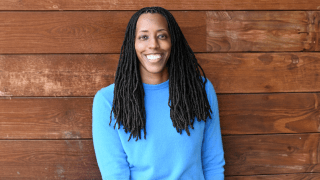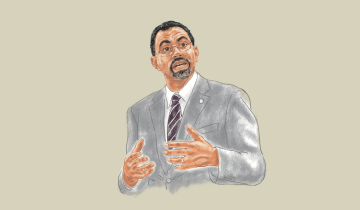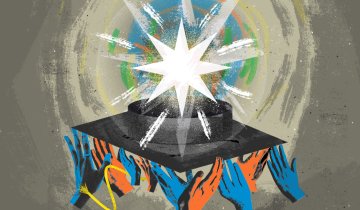“The most urgent challenge right now is going to sound very cliche because of my last name, but it’s love,” Bettina Love said when asked to reflect on her journey and what she believes is the most pressing issue in American education today.
A transformative figure at the intersection of education, race and social justice, Love is known for her candid critiques of educational systems, her advocacy for marginalized communities and her passionate calls for equity. As the William F. Russell Professor at Teachers College, Columbia University, Love is a prominent voice in reshaping the narrative of what education can and should be.
A Call to Love
Love means protecting students, teaching them to the highest standards, having thoughtful conversations and feeling a deep sense of responsibility for their well-being and success, according to Love. Drawing on the work of renowned theorist bell hooks, Love emphasizes that love is not merely an emotion, but an action. In her view, if educators and policymakers invested in love the way they invest in punitive measures, such as incarceration, the educational landscape would look dramatically different. Love is more than an idealistic notion for her—it’s a radical force capable of transforming education from the inside out. “If we loved each other and we’re committed to each other, this world would be a much, much different place.”
Her focus on love and care within the educational system challenges teachers to reflect on how they engage with all children—especially those from marginalized backgrounds. Love points out that truly loving students means more than simply offering kindness. It means committing to their futures and ensuring they are nurtured, heard and protected in their learning environments.
Joy as Resistance
Another theme in Love’s work is the importance of joy as a form of resistance. In her book, We Want to Do More Than Survive: Abolitionist Teaching and the Pursuit of Educational Freedom, she states that joy can be used in defiance against oppressive educational systems. For marginalized communities, joy becomes a powerful tool in overcoming the trauma caused by systemic inequities.
Love shared examples in the classroom and her personal experience where she saw joy intentionally cultivated. She recalled visiting a school where third graders were unexpectedly treated to a water balloon fight during a hot day in the South. In that moment, the teachers didn’t just teach—they offered a space for children to experience pure, unscripted joy. Joy in the classroom can manifest in simple yet transformative ways, such as moments of shared vulnerability, communal support and creative self-expression, she added.
Love recounted a personal story that included her wife, a teacher who embraced joy even during the challenging times of the COVID-19 pandemic. “I saw my wife turn our pantry into a club,” Love said. ”She sent glow sticks to all the students. It was party time in our pantry, blasting music, throwing a glow stick for a dark party on Zoom.” These moments of joy are more than simply fun—they are acts of solidarity that help students feel seen and valued for who they truly are. By embracing vulnerability and joy, educators can create environments that nurture the social-emotional development of their students.
Advocating for Mentoring in Education
As a vocal advocate for anti-racist teaching practices, Love shared how educators can prepare for the complexities of working in classrooms that reflect diverse identities and backgrounds. Her advice to future educators is straightforward: find mentors. “There is a lot to navigate, but, believe me, somebody in that building is a beautiful teacher,” Love said. “There's a teacher in that school that can help you become the teacher that you want to be.”
She highlights the importance of learning from experienced educators who share similar values and a commitment to transformative progress. Love stressed that every school has its unique ecosystem, and teachers need guidance to navigate this environment successfully. By connecting with mentors—experienced educators who have found success in creating inclusive, equitable classrooms—new teachers can learn the ropes of teaching while also gaining the wisdom needed to foster deep, meaningful relationships with their students.
Policy and Dreams: A Vision for Educational Reform
In her book, Punished for Dreaming: How School Reform Harms Black Children and How We Heal, Love explores the policies that disproportionately harm marginalized youth, especially Black and Brown students. Love connects real-life stories with policy analysis, helping readers understand that the struggles of these students aren’t due to a lack of effort or merit, but the result of deeply flawed educational policies.
“We are told in this country that we dream, that we dream big. Many students who are Black and Brown are punished for dreaming big,” Love added. “The educational policies that we have in this country are harmful to our dreams, [it] doesn't allow us to dream and can become our nightmare.” Rather than supporting aspirations, students often face educational policies that limit their potential, perpetuate inequality and leave them in a constant struggle. Her work encourages a deep rethinking of these policies, advocating for an educational system that supports all students, regardless of race, class or background.
A Call to Action for Universities
Love believes that universities like USC “can play a pivotal role” in fostering solidarity and resilience among future educators. “We think graduation is the end. It’s really the start,” she said. Universities must commit to supporting teachers throughout their careers. Education should be a lifelong process and institutions should help teachers continue to grow and develop long after they leave the classroom.
For Love, the work of education is not confined to the classroom but is deeply embedded in the community. Teachers, she believes, must stay connected to the communities they serve and universities should be a resource for teachers throughout their careers, offering support, professional development and inspiration.
Looking Ahead and Inspired by History
Love’s message to the next generation of education leaders is clear: embrace love, joy and community as transformative forces in education. “I am hopeful that our educators right now are watching a world that they want to deeply change and that they deeply want to be a part of that change,” Love said. In these uncertain times, she hopes that educators realize what it will take to be a leader and are up for the task. “I'm hopeful that a generation of teachers are inspired by history and by their ancestors. That they are inspired by communities that have done the most with the least.”




